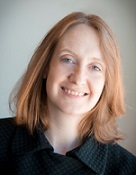Caroline Levine is a scholar of Victorian literature — one who’s spent plenty of hours poring over the words of Charles Dickens, George Eliot and the Brontë sisters.
Yet one of the University of Wisconsin-Madison English professor’s newest publications is an essay on the popular television series Mad Men, an edgy drama centered on a Madison Avenue ad agency in the 1960s.
Levine’s is one of 18 essays included in Mad Men, Mad World: Sex, Politics, Style & the 1960s, a collection released last month from Duke University Press. In her piece —“The Shock of the Banal: Mad Men’s Progressive Realism”— Levine argues that Mad Men“offers us a more hopeful political vision.”
“We’re often told that you can’t change a whole society, but Mad Men repeatedly shows us how much our daily habits have shifted,” says Levine, who notes the profound effect of activist campaigns in bringing about such changes.
This isn't Levine’s first foray into studying and writing about television. She became fascinated with The Wire during its critically-acclaimed run on HBO and has taught a course on it. Lauren Goodlad, a fellow Victorian literature scholar at the University of Illinois, knew of Levine’s interest in The Wire, and asked if she’d be interested in penning a guest piece about Mad Men for an academic group blog about the show.
[pullquote]We’re often told that you can’t change a whole society, but Mad Men repeatedly shows us how much our daily habits have shifted.
- Professor Caroline Levine[/pullquote]
We recently caught up with Levine to discuss her essay and the hit series, which opened its sixth season April 7. An edited transcript follows:
Q: What inspired you to write the essay?
CL: I was surprised by how different my own reaction to the show was from most critics. Most seemed to think the show made audiences feel self-congratulatory about living in an enlightened age, but my own response was the opposite — to draw inspiration from the show to think about changing our society now. I wanted to make a case for it as a progressive series.
On a personal level, too, I’m a woman with a career that I love, and I am grateful to all of the women who went before me who made my own path possible. So while I recognize that serious problems of sexism and racism are still structuring our society, Mad Men also reminds me to feel a deep gratitude to feminism.
Q: How does studying Mad Men fit into the rest of your research and teaching interests?
CL: I see crucial similarities between the 19th-century novel and contemporary television. For most of the 19th century, the novel was extremely popular, but most people thought it was frivolous or even dangerous. Some said it was turning people into mindless addicts — very much like TV in our time. But gradually some novelists started to develop long serialized narratives that grappled seriously with social relationships, and the novel started being taken seriously as an art form.
[pullquote]Mad Men — along with The Sopranos, The Wire, Game of Thrones, and others — are creating a kind of golden age of complex, thought-provoking, beautifully written narrative television.
- Levine[/pullquote]
Television seems to be moving along the very same path. Mad Men— along with The Sopranos, The Wire, Game of Thrones, and others — are creating a kind of golden age of complex, thought-provoking, beautifully written narrative television that I expect will be taken as seriously as 19th-century novels in the long run.
Q: Why do you think the series is so popular?
CL: The secret to good television is always in the writing. The acting has to be good, the characters interesting, and in the case of Mad Men, the set is gorgeous, but that won’t keep audiences for long. You also have to capture people with a plot that compels our interest and ideas that resonate across characters and episodes. Mad Men does a brilliant job of linking subtle details across its different plots. The text itself, without any of the cosmopolitan style, is rich and intriguing.
Q: Do you have a favorite character?
CL: The Mad Men website asks: “Which mad men are you?” When I saw that, my first thought was, “ Isn't everyone Peggy?” and then I realized, no, of course, that’s just me — I’m very much a Peggy. I love Peggy’s struggle to find fulfilling work. But all of the women are great. Joan is a fantastic character, and I’m very much looking forward to seeing how Sally’s plot develops.
Q: How would Don Draper fit into a piece of Victorian literature?
CL: Don is a classic 19th-century hero — a social climber with a mysterious past and a knack for grasping the desires of the social elite. In many ways he’s most like a character in a French novel, with his philandering and his musing on mortality and ambition — Balzac rather than Dickens.
Q: What are your expectations for Season 6?
CL: I can’t wait to see what happens when the social movements of the late 1960s actually take place!

